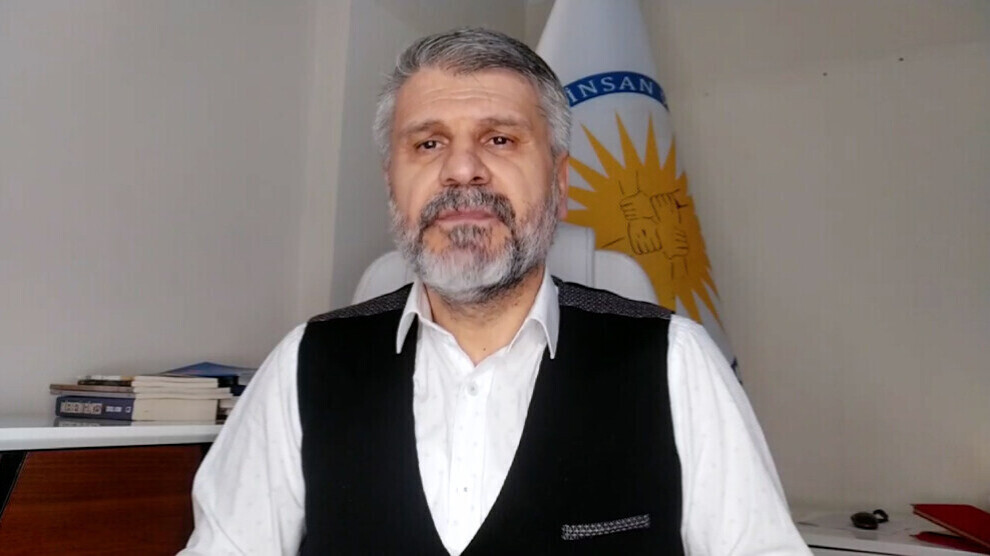Kaya: The government’s approach to the process is not sufficient
Ahmet Kaya said that defining the current process only as “ending terror” ignores the Kurdish people’s legitimate demands.
Ahmet Kaya said that defining the current process only as “ending terror” ignores the Kurdish people’s legitimate demands.

Ahmet Kaya, co-chair of the Human and Freedom Party (PIA), spoke to ANF about the process that began following the Kurdistan Workers’ Party’s (PKK) decision to end its armed struggle in response to Abdullah Öcalan’s call. Kaya stated that the government’s current approach falls far short of making the most of this historic opportunity. He said, “Security-oriented reflexes carry the risk of blocking political dialogue and democratic openings in the future. Such a narrow framework is more likely to suppress and deepen problems than to achieve genuine social peace.”
Kaya pointed out that, in recent years, Turkey has navigated the Kurdish question under the shadow of prolonged conflict. “The PKK’s recent step to end armed struggle strengthens the possibility of returning the issue to a political ground for discussion and resolution. This is a critical threshold, both for the state and for society. But we must have already learned that peace does not simply mean the silence of guns. Real resolution requires building a democratic order that meets the political, cultural, and social demands of the Kurdish people.”
Kaya emphasized that the Kurdish question is not only a political but also a deeply social issue. “Approaching it with mutual accusations, exclusionary rhetoric, or nationalist reflexes only further damages an already fragile social fabric. The language used in the media and politics today often escalates tensions rather than calming them, and this becomes a serious obstacle to the peace process.”
Kaya referred to past efforts and added: “The positive steps taken during the peace process, such as the Dolmabahçe agreement and attempts at democratic outreach, had a significant impact on society. But the hardening of the state’s stance and subsequent inconsistencies severely damaged public trust. We must learn from that experience. The space for debate must not be based on hostility; it must rest on pluralism and empathy.”
A Turkey without terror is an inappropriate term
Ahmet Kaya emphasized that framing the Kurdish question solely around “security” or the “end of terror” is one of the greatest obstacles to peace. He noted that such a narrow approach is often used deliberately to obscure the broader and legitimate demands of the Kurdish people. Kaya underlined that reducing the Kurdish issue to the problem of violence is a political maneuver designed to postpone real resolution. “The slogan ‘a Turkey without terror,’ whether used consciously or not, carries the risk of criminalizing the demands of the Kurdish people. Yet, a large part of this population seeks an end to violence, while also struggling for fundamental rights such as education in their mother tongue, empowered local governance, and justice in democratic representation. Any approach that fails to recognize both of these realities will only reproduce the deadlock.”
Kaya stressed that sustaining a nonviolent era cannot be achieved through security policies, but rather through political courage and democratic reform. For the process to be stabilized and grounded in concrete progress, he called on the state to take immediate steps to meet the Kurdish people’s demands:
Right to education in the mother tongue: “The public use of Kurdish and the recognition of the right to education in one’s mother tongue can no longer be postponed. This right is not only cultural; it also provides a psychological foundation for equality.”
Local governance reform: “The appointment of state trustees has effectively stripped the Kurdish people of their right to vote and be elected. The removal of elected mayors has severely damaged public trust in politics. These practices must end, and the autonomy of local administrations must be strengthened.”
Confronting the past: “Incidents such as the Roboski massacre, enforced disappearances, and forced displacement remain open wounds in the collective memory. Genuine reckoning with these events is a prerequisite for building trust.”
Expansion of political space: “The Peoples’ Equality and Democracy Party (DEM Party) and other Kurdish parties are constantly criminalized. Shrinking the political space undermines the legitimacy of representatives. On the contrary, political participation must be encouraged, and the rights to expression and organization must be guaranteed.”
Existing political parties are inadequate on the Kurdish question
Ahmet Kaya also criticized the main opposition and other political parties in Turkey for their failure to demonstrate the political will to confront and resolve the Kurdish question. He continued: “Mainstream opposition parties remain limited to surface-level rhetoric when engaging with Kurdish voters. Concepts like ‘reconciliation,’ ‘inclusivity,’ and ‘normalization’ are still being repeated today, just as they were during election campaigns. But unless these ideas are transformed into concrete policy, they carry little meaning. The ruling party, meanwhile, continues to center its approach around security policies. Evaluating the Kurdish issue solely under the label of ‘counterterrorism’ narrows the space for political solutions. We have already experienced the devastating consequences of this approach for many years: distrust and a loss of democracy.”
To resolve the Kurdish issue in an inclusive way, we must first recognize it as a rights-based problem. This is not only a test for the Kurdish people, but for democracy in all of Turkey. An inclusive political approach requires a constitutional framework where everyone is recognized as an equal citizen. Cultural rights must be defined not as privileges, but as fundamental rights. A strong local democracy must be built to ensure greater public participation in decision-making processes. Freedom of expression and representation must be fully guaranteed. Only then can true democratization take place.”